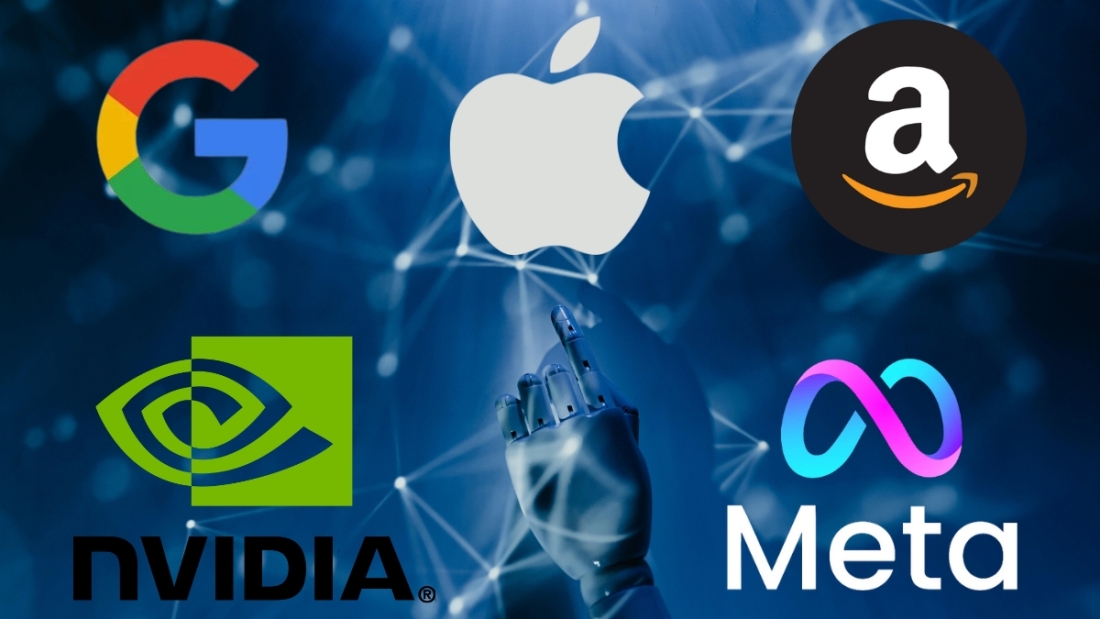The AI race, sparked by OpenAI’s ChatGPT, has major players escalating their efforts in artificial intelligence to secure supremacy. This development in the hands of a few tech giants raises concerns about monopolizing these innovative technologies that require massive computing resources and data.
As big tech companies continue to push the boundaries of artificial intelligence, voices like Meredith Whittaker of Signal and Frank McCourt of Project Liberty warn about the risk of monopolizing AI’s future. The battlefield of big tech AI not only determines the next leader in technology but hints at profound impacts on industries and consumer dynamics.
Leading Contenders in the AI Race
In the dynamic landscape of AI development, the leading contenders are not just competing in innovations but also in strategic investments and partnerships.
Microsoft: Their significant $10 billion investment in OpenAI, the creators of ChatGPT, has positioned it as a frontrunner. This collaboration has led to the integration of generative AI into Bing and Edge. This ultimately showcases their commitment to leading in AI-driven search and content creation.
Google: Alphabet Inc., stands as a major player with its vast investments in machine learning, natural language processing, and robotics. Google’s strategic moves, including the ‘code red’ initiative and the launch of Bard, its search-oriented chatbot, highlight its aggressive approach to maintaining its supremacy in AI.
Meta Platforms: With a focus on creating open-source Artificial General Intelligence (AGI), Meta combines its research groups FAIR & GenAI. It’s training its LLM LLaMA 3 with a staggering number of Nvidia GPUs, aiming for a stockpile to further its AI capabilities and maintain a competitive edge in the AI race.
These strategic investments and developments underscore the intensity of the competition. Each heavyweight aiming to leverage AI to secure a dominant position in the future of technology and innovation.
Key Factors Determining the Winner
In the fiercely competitive AI landscape, several key factors are poised to determine the victors in this technological tug-of-war:
Ethical AI Development
Companies emphasizing ethical AI practices are likely to gain a competitive edge through increased trust and security. The emergence of AI ethics and incorporating moral considerations into AI systems, reflects a shift towards responsible innovation.
Talent Acquisition and Expertise
The demand is soaring, with companies offering lucrative compensation packages to attract top talent in generative AI. This includes expedited stock-vesting schedules and the ability to poach entire engineering teams. This highlights the critical role of human capital in AI advancements. It also tell us what the college kids should be learning about.
Open Source vs. Proprietary AI Models
A strategic dilemma faces companies between adopting open-source models. These models offer free access to data and methodologies, and proprietary routes that keep processes exclusive. Open-source projects like Falcon, Vicuna, and Llama 2 illustrate the diversity in approaches to AI development. This applies to all ranging from small-scale tasks to extensive applications. These elements collectively shape the trajectory of the AI race.
Potential Impact on Industries and Consumers
The transformative potential of AI across various industries is both vast and nuanced, with significant implications for both industries and consumers:
Creative Industries: AI’s ability to produce high-quality work at scale offers a unique collaboration opportunity. For all types of creatives such as artists, writers, and musicians, automating tasks will enhancing productivity while maintaining creativity.
Healthcare: From automating surgery with precision to streamlining administrative processes like prior authorization. AI stands to revolutionize healthcare delivery, albeit with necessary caution to mitigate potential errors.
Ecommerce and Digital Marketing: AI personalizes shopping experiences and combats fraud for consumers. For sellers in digital marketing, it streamlines content creation and engages customers more effectively. However, it cannot replicate the personal touch crucial for customer connection.
Impact
Industries like finance, retail, and manufacturing are witnessing AI-driven enhancements in risk management, inventory management, and production efficiency, respectively. AI’s role in improving customer experiences, automating financial processes, and enhancing quality control is pivotal.
In sectors as diverse as education, agriculture, and energy, AI’s impact ranges from improving student outcomes and crop yields to enhancing energy efficiency. The entertainment and insurance sectors, too, are being reshaped by AI’s capabilities in content personalization, risk assessment, and fraud detection.
Big tech companies like Google, Amazon, and Microsoft are leading the charge, integrating AI into products and services to enhance functionality and user experience. Their investments in AI research and development are setting the stage for innovative applications across industries, from smart assistants and cloud computing to autonomous vehicles and AI-driven customer service.
The Future
This race not only underscores the competitive efforts to lead in AI-driven solutions but also raises important discussions about ethical AI development, talent acquisition, and the choice between open-source versus proprietary AI models. These elements collectively forecast a future where technology and innovation converge at the intersection of ethical considerations and strategic competitiveness.
The implications of this race extend far beyond the realm of big tech companies, touching industries and consumers alike. From healthcare and creative industries to ecommerce and digital marketing, the transformative potential of AI is boundless, promising enhancements in efficiency, creativity, and personalization. However, as we venture further into this AI-driven era, the importance of ethical practices, balanced power, and equitable access to technology cannot be overstated. The future of the AI race, while uncertain, is poised to redefine the boundaries of technology, innovation, and human-machine collaboration, urging a continuous dialogue on its course and its impact on society at large.



Leave A Comment